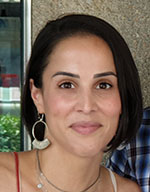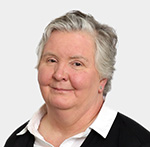Working together to enhance transitions of care for people with dementia - webinar
Working together to enhance transitions of care for people with dementia - webinar

Using real-life case scenarios, the panel, consisting of a geriatrician, GP and nurse, discuss the challenges of optimising transitions of care for people living with dementia.
This webinar has been developed in partnership with Dementia Training Australia.
Recorded on Wednesday, 26 August 2020
View on-demand
View the learning outcomes.
Target audience: General practitioners, pharmacists and nurses
Open to: All health professionals and students
Cost: Free
CPD points: Self-reported CPD - view details
About the webinar
This webinar focuses on the impact of transitions of care on changed behaviours among people with dementia. Panel members will provide practical advice on how to use the transition between hospital, home or an aged care facility as an opportunity to monitor and review management.
Meet the panel
Join our multidisciplinary panel as they provide their collective perspectives on working together as a team, and the importance of communicating with families and carers.
Kara Joyce (webinar facilitator)

Kara Joyce is the Clinical Lead on the NPS MedicineWise program, Dementia and changed behaviours: a patient-centred approach. Over the past 4 years Kara has been part of the national field force delivering NPS MedicineWise education programs to GPs and pharmacists. She is an accredited pharmacist who has a special interest in dementia care and will be the facilitator for this webinar.
Associate Professor Michael Woodward

Associate Professor Michael Woodward is Head of Aged Care Research at Austin Health in Melbourne. He is a specialist in geriatric medicine with major interests in the treatment of Alzheimer’s disease (AD) and other dementias, as well as quality use of medicines. As head of the Memory Clinic at this centre he is involved in several research trials of new therapies for AD and related disorders. He is a Past President of the AC4R – the Australasian Consortium of Centres for Clinical Cognitive Research – that brings together researchers into therapeutic agents for dementia and is Honorary Medical Advisor for Dementia Australia.
In 2016 he was awarded Membership of the Order of Australia for his professional and academic work.
Dr Troye Wallett

Dr Troye Wallet is a GP with a specific interest in working with older Australians in aged care facilities. He feels privileged to have been on the Expert Advisory Committee for the RACGP Aged Care Guide (Silver Book) and sits on the Federal Aged Care Clinical Advisory Committee which is tasked with improving the use of antipsychotics in aged care facilities.
He is compelled to learn and teach and so he does. His style is open, engaging and conversational because no one likes boring lectures.
Dr Margaret Winbolt

Dr Margaret Winbolt is a Director with Dementia Training Australia (DTA) and Senior Research Fellow in the Australian Centre for Evidence Based Aged Care (ACEBAC) at La Trobe University. Margaret is a registered nurse with over 30 years’ experience and knowledge in the care of people with dementia and the needs of people with dementia and their carers. Margaret is the DTA Director responsible for the delivery of DTA’s Fellowship and GP education programs
CPD points
Self-directed CPD
It is recommended that 1 CPD hour be recorded for the purposes of self-directed CPD.
Learning outcomes
By the end of this activity, participants should be able to:
- Develop a management plan for each person, using a person-centred approach that involves the multidisciplinary team, to find non-pharmacological strategies to help manage behaviours
- Identify that antipsychotics or benzodiazepines have only specific and short-term uses in the management of people with dementia who show changed behaviours
- Review and monitor patients who are taking psychotropic medicines to assess the risk of harm from continued psychotropic use, as well as the potential benefits of deprescribing